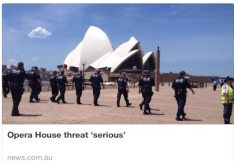After Opera House evacuation, is it time for media to stop reporting every terrorism scare?
 Yesterday’s false alarm at Sydney Opera House led evening TV bulletins and dominated online coverage. But as Australia moves into a time of increased terror threats, security scares are going to become a fact of public life – and the media risks becoming part of the problem, argues Mumbrella’s Tim Burrowes.
Yesterday’s false alarm at Sydney Opera House led evening TV bulletins and dominated online coverage. But as Australia moves into a time of increased terror threats, security scares are going to become a fact of public life – and the media risks becoming part of the problem, argues Mumbrella’s Tim Burrowes.
Although I wasn’t officially on weekend duty, for some reason I was in the newsroom when my colleague took the call.
I could see from the expression on his face that he was alarmed.
 “The code word is ‘orange orchid’,” a man with an Irish accent told him. The caller then went on to give him the address of the local army barracks where, he informed him, a bomb would be exploding in half an hour.
“The code word is ‘orange orchid’,” a man with an Irish accent told him. The caller then went on to give him the address of the local army barracks where, he informed him, a bomb would be exploding in half an hour.


Hi there,
I totally agree with you 100%. I actually work at the Sydney Opera House by night and that afternoon, we, the staff, were given the a-okay to start working that night by our manager, around 3:30pm, just as the police were leaving.
The sydney siege, london bombings, paris bombings…everything that has occured in the past 10 years, the media has picked up on every single attempt and “false alarm.” Its so repetitive that people in contemporary society have just seen these terror attacks as just part of the norm. They are featured so regularly that it’s now just becoming background noise and doesn’t have the same affect on bystanders when it makes headlines.
It’s sad but if you look at both sides, maybe putting it in the news could work to help people not become afraid and become fearless. If we see less in the media, it means that this news will make people afraid to live their lives and leave their houses. We are so exposed to information that it is unbelievable.
Periscope was created by the founder of twitter in order to experience issues overseas through live streaming because reading news reports through little tweets wasn’t good enough even though the idea of twitter was phenomenal. Receiving news within seconds isn’t good enough?
It’s not like we can expect people to boycott the idea of having knowledge in every way and form at their fingertips. The amount of knowledge that one person can receive in a split second is just going to get bigger and alot quicker- as they would say, if you can’t beat them, join them.
Terror attacks is a tactic used to create fear and they have used the internet and social media to be the basis of their plans. We should show people MORE of whats out there to decrease the element of surprise and thus, not giving fear as an option to the billions of people watching, listening or reading the news.
Kind Regards,
Ashleigh
“Yesterday’s false alarm at Sydney Opera House led evening TV bulletins and dominated online coverage. But as Australia moves into a time of increased terror threats, security scares are going to become a fact of public life – and the media risks becoming part of the problem, argues Mumbrella’s Tim Burrowes.”
But Tim, Murdoch, Stokes, eh al want to make sure that the Australian public is scared, so that they continue to vote LNP. They relish broadcasting any event that will marginalise certain groups and drive fear into the heart of the people. Business as usual for them.
Tim Burrowes repeats the Turnbull assertion that “the overwhelming majority of Muslim Australians are good people”. The assertion is no doubt true, but is constant repetition of that mantra responsible journalism?
I ask this because repeating it carries the implication that Islam is fundamentally benign, whereas the reality is that Islamic theology is a permanent source of intellectual justification for violent jihad. Is that not so?
Herbert, no where has Tim mentioned Islam. This is about media reporting and I wholeheartedly agree with Tim. There’s no need for this reporting. It adds no value and simply stirs up more fear.
Agree 100 percent.
It only encourages idiots to carry out “copycat” hoaxes etc.
Actually our news bulletins need to start giving more prominence to issues, overseas stories, and cutback on the old fire chasing and crime stories.
I wonder if the public realises the crime rate is at an all time low and the road toll is also at historic lows.
You’d never think that if you watched the news.
@Nathan: re-read the last few paragraphs (7th from last by my count):
“Contrast that with the calmer Malcolm Turnbull approach of reminding his audience that the overwhelming majority of Muslim Australians are good people and emphasising cohesion.”
This doesn’t mean that I agree with Herbert’s point, but he isn’t imagining what Tim wrote.
Back when I were a lad in a big newsroom, bomb scares and suicides were not to be reported because experience showed they led to copycats.
But, when a police response involves stopping ferries, evacuating the Sydney Opera House, Manly Wharf and the Botanical Gardens the public probably deserves to know there is an operation underway to explain the significant disruption.
My view is that once it is over and the all clear given there is no reason for further coverage.
@Geoff Field
SBS News all the way for a decent bulletin. 7, 9 and 10 are not news, they are agenda pushing propaganda machines. ABC is great for local.
Australia has shifted from ‘mateship’ to fear and loathing. Our political masters have done a great job. Wait for it to ratchet up to distract us from falling living standards and growing unemployment and marginalisation. What we should fear are the lies that are peddled as MSM….
Apologies. Somehow missed that. Even did a ctrl+f to make sure.
Hi Tinfoil, To a point yes.
After being overseas and watching the BBC where they are not afraid to mix grey haired presenters and senior correspondents with the newbies, I worry that the ABC doesn’t have enough gravitas and experience.
I still see too many bulletins leading with stories about fires and crashes that will be forgotten about the next day! The old saying “if it bleeds lead with it” still exists in this country unfortunately.
Classic example from News Corp today: http://www.news.com.au/nationa.....3b7ba04e3e